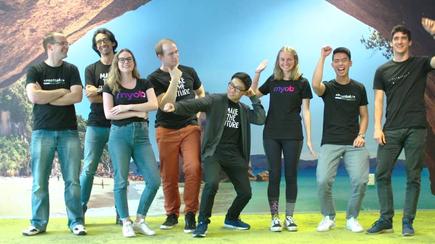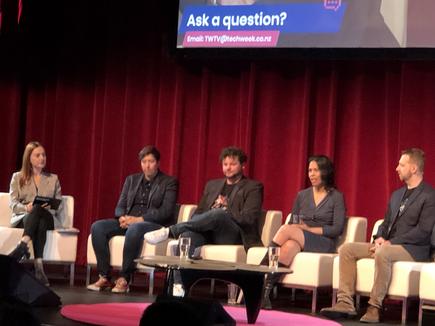Nearly half of tech industry’s female leaders experienced gender bias at work: MYOB
- 23 May, 2019 06:30

This is concerning, given that the tech sector is one of the country’s fastest growing industries with a reach that will increasingly transform the entire economy
New Zealand prides itself on its record of women’s rights and representation.
“We were the first nation to give women the right to vote, and in the 126 years since, our country has made significant progress in ensuring gender equality,” says MYOB country manager Ingrid Cronin-Knight.
But, she says, much work needs to be done in the business sector, and in technology in particular, if New Zealand is to live up to its reputation as a society that recognises, promotes and enjoys the full benefits of equal representation for women.
Cronin-Knight says the latest MYOB Women in Tech report finds nearly half of the tech industry’s female leaders have personally experienced gender bias at work.
Cronin-Knight says that although the survey didn’t delve into the types of biases respondents experienced, there is a broad range of gender-based biases a person can experience in the workplace.
These include being overlooked for a promotion, getting paid less than their peers, or gender-based stereotypes and assumptions, she tells CIO New Zealand.
The report also says just 25 per cent of local technology businesses have equal representation in their leadership team (41 per cent to 60 per cent of their leaders are female).
It finds that only one in 10 SMEs in the tech sector have anti-discrimination policies or rules in place to stop gender bias.

It’s important for every industry to promote and champion the female business leaders – both old and young – who are already striving for change and tackling the big issues within their own organisations
Less than half pay their female employees the same as men in the same role, according to the survey, held in March 2019 among more than 1000 small business owners across New Zealand.
Conducted by Colmar Brunton, the survey sample includes 220 technology-related companies (IT services, software development, digital marketing, web development and others), as well as responses from 383 female business owners and 625 male business owners.
The research is concerning, given that the tech sector is one of the country’s fastest growing industries with a reach that will increasingly transform the entire economy, says Cronin-Knight.
“This sector employs 6 per cent of the Kiwi workforce, contributes more than $16 billion to GDP, and produces 9 per cent of exports,” she says.
The survey finds male and female technology leaders also view the diversity challenge differently.
Only a fifth (21 per cent) of New Zealand businesses believe gender diversity is important to their business.
While nearly two fifths (38 per cent) of female-owned technology businesses said gender diversity was important to them, less than a quarter (23 per cent) of male-owned technology businesses said the same.
On a positive note, the survey found policies to assist in building gender diversity are more commonly used by technology businesses than other SMEs. Just one in 10 tech companies report no policies, while nearly a quarter (24 per cent) of all SMEs said the same.
Tech companies are also more likely to provide flexible work hours in support of gender diversity than general SMEs. More than two fifths (43 per cent) of technology SME business owners said they offer their staff flexible work hours as a policy to build gender diversity and inclusion.
“We are calling on the local tech sector - and wider business community - to do more for women in tech and young girls in STEM-related fields of study,” says Cronin-Knight.
“Where we go from here – and how we choose to educate young girls – will have a significant impact on the future workforce, and the future of communities and people across the country.”
Wanted: champions for diversity
Cronin-Knight says New Zealand must rethink how it educates its young people, and work to expose more women and young girls to the industry early on in the education cycle.
“It’s also important for every industry to promote and champion the female business leaders – both old and young – who are already striving for change and tackling the big issues within their own organisations,” she says.

“Only 1 per cent of Maori are working in technology
MYOB, which released the report during the 2019 Techweek, augmented the survey with a range of industry data.
It points out the Stats NZ Quarterly Employment Survey (Q1 2019) reports female employees in the information, media and telecommunications industry earn, on average, $7.88 less per hour than male employees from the same industry.
Those in the professional, scientific and technical fields also earn less than their male counterparts – around $6.28 less every hour worked.
Despite making up around 43 per cent of the workforce, according to the Mastercard Index of Women Entrepreneurialism 2017, the 2013 census found just 23 per cent of ICT employees in New Zealand are women.
“This lack of representation starts from early in their careers. Young women are less likely to study ICT, computer science and other STEM-related fields at university,” says Cronin-Knight.
NZTech, meanwhile, says only 36 per cent of computer science and information technology students were female in 2016. Data from the Ministry of Education also highlights that 82 per cent of engineering students were male in 2015.
And as women progress in the workforce in New Zealand, they increasingly face difficult choices when it comes to managing work and family life.
Nearly a quarter of non-working women says the reason for leaving their last job was because of parental or other family responsibilities, while only 4 per cent of men say the same, according to the Stats NZ Household Labour Force survey 2018.
“To ensure a sustainable, profitable and more inclusive tech workplace for all New Zealanders – now and in the future – we need to take action,” says says Cronin-Knight.
“We need to look deeply into the data, understand the reasons why women are being underpaid, under-represented and discriminated against. And, as an industry, it is not enough just to ask the question, we must work to find the answers.”

Cronin-Knight says MYOB is contributing to improve representation of women in technology through a range of programmes such as DevelopHer, paid scholarships to women who are changing careers or looking to re-enter the workforce; targeting the hiring of women into more than 40 per cent of entry level engineering roles; and actively seeking opportunities to transfer female leaders from other areas into technology team.
She says MYOB also completed its first gender pay-gap analysis and continues to focus on this area with regular reviews, to ensure no pay-gap exists between men and women in equivalent positions.
She says MYOB CEO Tim Reed has continued his active support through his membership of the Male Champions of Change initiative, ensuring that commitments are delivered within MYOB.

Underrepresented communities
The importance of ensuring diversity and inclusion in organisations is highlighted in one of the panel discussions during the launch of TechWeek in Auckland.
Our company tells stories through gaming, says Nihoniho.
Metia Interactive is Maori-owned but its team members come from different cultures, she explains.
“Diversity is important especially when you are telling a story,” she says. Diverse teams provide more, better and different ideas
An area Nihoniho points out is the lack of Maori participation in the technology sector.
“Only 1 per cent of Maori are working in technology, that is very low,” she says.
Nihoniho says she has been working for the past 16 years in the game industry. “I wish someone told me you can do gaming design in high school.”
Her experience has inspired her to talk to underrepresented communities in technology.
“I created a game that would teach anybody a creative way to think about coding,” she says. Her goal is for people who complete the game to think that coding is not hard and will be interested to study about it further.
“I had to go out into the community that may not necessarily have access to technology and give them this game to play,” she says.
If you are developing [a programme] for an underrepresented community, it could be in technology or mental health, “go to the community, find a person to speak to that opens the doors,” she advises. “You need to have support to build solutions to those problems that are out there.”

Sign up for CIO newsletters for regular updates on CIO news, career tips, views and events. Follow CIO New Zealand on Twitter:@cio_nz
Send news tips and comments to divina_paredes@idg.co.nz @divina

